 There is a difference between trouble falling asleep and a sleep disorder.
There is a difference between trouble falling asleep and a sleep disorder.
What's more, diagnosing sleep disorders can be difficult, even for sleep professionals.
For family practices, dentists, primary care physicians, and specialists like ENTs, the challenge in narrowing down their patients' medical concerns to those which may be related to poor sleep can be even more difficult.
Fortunately, there are tools available to help healthcare professionals to identify the potential for sleep disorders in their patients.
These tools are also available for patients who suspect their sleep problems are the result of an undiagnosed sleep disorder or ongoing sleep deprivation.
Are You Sleep Deprived?
There are a number of possible causes of sleep deprivation, some of which include:
-
Frequent urination at night
-
Alcohol consumption
-
Changes in the body's natural internal clock
-
Decrease in REM sleep
-
Prescribed and non-prescribed medication
-
Depression
-
Neurological illnesses
-
Lack of activity
-
Chronic pain
-
Caffeine and nicotine
 But what if it is more that just being sleep deprived?
But what if it is more that just being sleep deprived?
Is It a Sleep Disorder?
A sleep disorder is simply defined as changes in the way that a person sleeps. Sleep disorders are potentially serious and may not only be harmful to a person’s overall health; they can pose a risk to your personal and public safety.
When poor sleep is not obviously caused by one of the factors listed above, a more thorough screening may be necessary to determine the possibility of a hidden sleep disorder.
Some examples of more common sleep disorders are:
-
Sleep Apnea: Sleep apnea is when a person’s breathing during sleep repeatedly stops and starts. It is a potentially serious sleep disorder linked to many long-term chronic illnesses, and it is also considered a chronic illness. Types of sleep apnea are obstructive sleep apnea (OSA), central sleep apnea, and complex sleep apnea syndrome. Some symptoms of sleep apnea include loud snoring, morning headaches, abrupt awakenings, and insomnia.
-
Shift Work Disorder: This is when one has trouble falling asleep or staying asleep due to unusual work shifts. Symptoms can include excessive daytime sleepiness, lack of energy, insomnia, difficulty concentrating, and irritability.
-
Insomnia: This occurs when a person has trouble falling asleep or staying asleep throughout the night.
-
Restless Legs Syndrome (RLS): Also known as Willis-Ekbom disease, RLS can cause an uncomfortable sensation or urge to move your legs while you try to fall asleep.
-
Narcolepsy: Extreme sleepiness and falling asleep suddenly during the day.
6 Screening Tests for Sleep Disorders
If you or your doctor suspects that you may have a sleep disorder or wants to rule out a sleep disorder, there are some tests that he or she can administer. These are all basically questionnaires which help to identify the probability that a sleep disorder exists.
Take a look at the following 6 screening tools that may reveal hidden sleep disorders.
#1. STOP-Bang 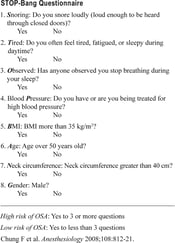
Targeted Patient Group: Patients suspected to have OSA
STOP BANG is a screening tool for OSA. STOP-Bang is the acronym for snoring, tired, observed, pressure, body mass, age, neck, and gender. It consists of only eight questions.
Click here to view the STOP-Bang screening questionnaire.
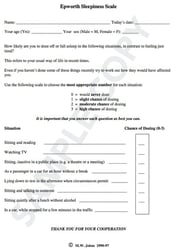 #2. Epworth Sleepiness Scale
#2. Epworth Sleepiness Scale
Targeted Patient Group: Patients suspected to have excessive daytime sleepiness
The Epworth Sleepiness Scale (ESS) was created to assess daytime sleepiness. It is a self-administered questionnaire with eight questions. At the most, the questionnaire can be finished in three minutes.
Click here to view the Epworth Sleepiness Scale.
#3. Insomnia Severity Index 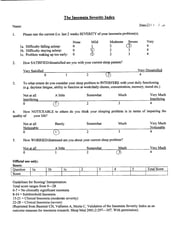
Targeted Patient Group: Patients suspected to have insomnia
The Insomnia Severity Index was developed to detect insomnia and to assess its nature, impact, and severity. The index consists of seven items and is ranked using a five point Likert scale.
Click here to view an example of the Insomnia Severity Index.
#4. Preoperative Questionnaire
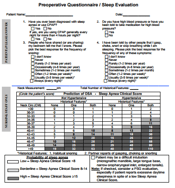 Targeted Patient Group: Patients suspected to have OSA,
Targeted Patient Group: Patients suspected to have OSA,
who are about to have surgery
The Preoperative Questionnaire is typically used by a physician to identify a patient’s risk of OSA before surgery. It only has three questions, but requires a measurement of the patient’s neck circumference by medical staff.
Click here to view a Preoperative Questionnaire.
#5. Berlin Questionnaire 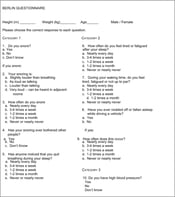
Targeted Patient Group: Patients suspected to have OSA
The Berlin Questionnaire consists of ten questions over three categories. It requires the use of an answer key to determine results, which many physicians may find difficult. However, it is also considered one of the best screening tools for OSA.
Click here to view a Berlin Questionnaire.
#5. PSQI (Pittsburgh Sleep Quality Index)
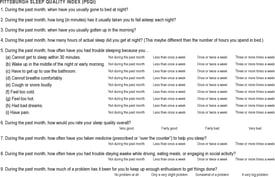 Targeted Patient Group: Patients with poor sleep quality associated with sleep disorders, depression, and bipolar disorder.
Targeted Patient Group: Patients with poor sleep quality associated with sleep disorders, depression, and bipolar disorder.
The Pittsburgh Sleep Quality Index (PSQI Instrument) assesses overall sleep quality over a 1-month period. The questionnaire is self reported by the individual and each item is weighted on a 0–3 interval scale.
Click here to view the Pittsburgh Sleep Quality Index.
Risks of Untreated Sleep Disorder
There can be many barriers to a good night’s sleep. If those barriers aren’t resolved and sleep disorders go untreated, it can lead to more serious medical problems. The risks of untreated sleep disorder include:
-
Microsleep
-
Impaired memory
-
Inability to focus
-
Irritability
-
Cognitive impairment
-
Depression
-
Sleepiness on the job
-
Decreased attention
-
Breakdown of the body’s metabolic process
-
Fatigue
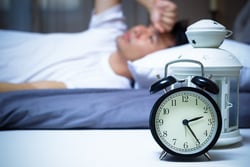
Sufficient, quality sleep is closely linked to good health and sleep disorders can be potentially very harmful, leading to chronic illness.
These 6 screening instruments may provide you with the help you or your physician need to discover if you, indeed, have a sleep disorder.
